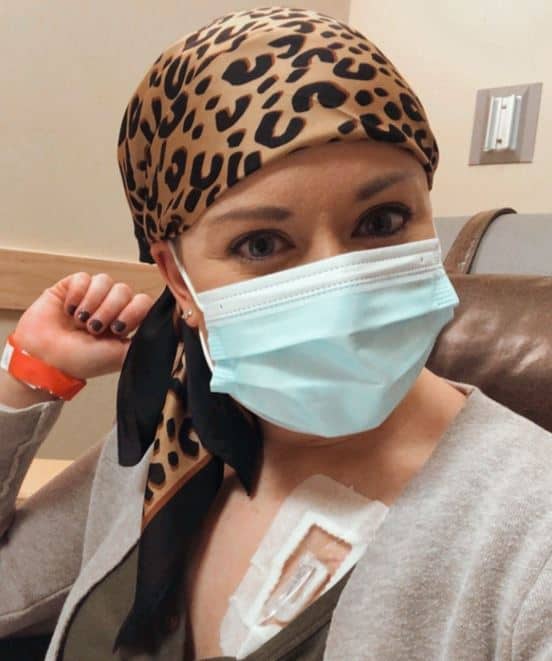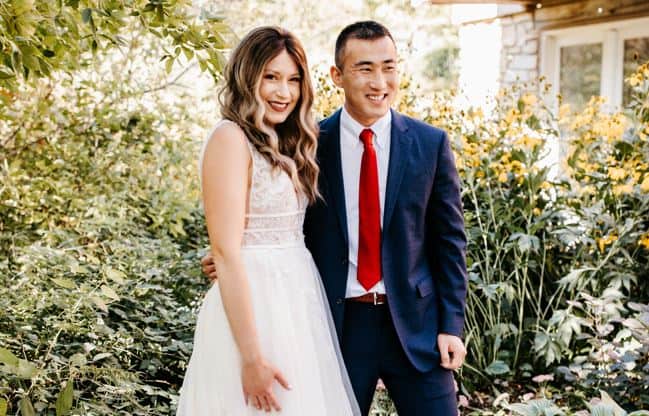
Katie Heacox was just 29 years old and newly engaged when she learned she had breast cancer. Her experiences led her to become a Komen advocacy insider, giving her an opportunity to help make meaningful change for people with breast cancer.
Breast cancer was not on my radar.
In November 2020, I moved across town and wanted a new primary physician closer to where I lived. It was in the middle of COVID and so I was going back and forth – do I want to find a new doctor now, do I want to go into a doctor’s office? – but I had some prescriptions I wanted refilled, so I found a new primary care physician and made an appointment.
At the appointment, the nurse asked whether I wanted the doctor to do a clinical breast exam, and I thought, well, I’m here, sure, that’s fine. The doctor found a small lump during the breast exam. She told me, “You’re young, it’s probably dense breast tissue, but why don’t you get an ultrasound?”
At the ultrasound, they couldn’t really conclude anything, so they recommended a diagnostic mammogram. And, again, they couldn’t really conclude anything, so they recommended a biopsy. We did that and then I went home.
At this point in my life, I didn’t know anyone personally who had had breast cancer. I didn’t have a family history, no close friends or relatives. Breast cancer was not even a thought. During the biopsy I thought, well it must be something, but I never thought cancer.
The following week I got the call: I had breast cancer. At that time, they thought it was stage 0. Hearing the words breast cancer was insane. It took a long time for me to process. I was working from home at the time and got the call in the middle of the workday. My now-husband was home as well, so I wasn’t alone after the call. We had time to sit there and try to process it. I didn’t think young people got breast cancer. No one in my family had gotten so – so why me? It was a lot to process.
I met with the breast surgeon alone because of the pandemic. That was one of the hardest things about my journey. We put my fiancé on speaker phone and talked through the different options in terms of surgery and treatment. They didn’t know yet if I would need chemotherapy, so I had surgery first.
I opted for a bilateral mastectomy. It was a pretty easy decision for me. I wanted to do everything we could. I didn’t want to have to go through another breast surgery at age 39 or 49 or 59.
Surgery happened fast. The surgeon called and said there was an opening the following week. My brain was very much ‘okay, what’s the next step?’ I couldn’t really process any of it. With COVID, there were just so many unknowns, so we jumped at the chance to get my surgery scheduled.
After the bilateral mastectomy, doctors confirmed it had not spread to my lymph nodes, which was good, but the diagnosis changed because the cancer was more invasive than they initially thought. It was classified as stage 1 HER2 positive, hormone negative breast cancer.
Once I recovered from surgery, I underwent chemotherapy. I did 12 rounds of one chemotherapy, followed by a year of another type of chemotherapy that targeted the HER2 positive.
When I finished treatment, I knew I wanted to get involved with the breast cancer community. I want to do all I can to help and support others who are going through this. I felt like I was now a part of this community of women, and I wanted to get involved in any way I could.
I reached out to Susan G. Komen to learn more about the ways I could get involved and am now a Komen advocate. Komen does so much, from research to advocacy. They’re working to get the message out about the policy changes we need to make and the legislation we need to pass.
Luckily, I had pretty good insurance when I was diagnosed, but what about the women who don’t have that? Doing advocacy work that can lead to changes will help someone else who’s diagnosed or knows someone who was diagnosed. It means the world to be able to do that.
For me, being an advocate is a way to be involved in the changes that need to happen. Breast cancer has touched my life in a way I never expected and never would have imagined. If I can be involved in a way to make someone else’s diagnosis easier or help make even just the detection of breast cancer and the affordability easier for someone else, I want to be a part of it.

Statements and opinions expressed are that of the individual and do not express the views or opinions of Susan G. Komen. This information is being provided for educational purposes only and is not to be construed as medical advice. Persons with breast cancer should consult their healthcare provider with specific questions or concerns about their treatment.



